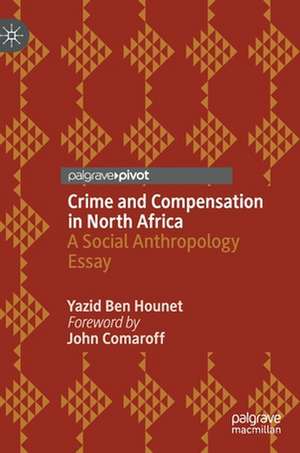Crime and Compensation in North Africa: A Social Anthropology Essay
Autor Yazid Ben Hounet Cuvânt înainte de John Comaroff Traducere de Christine Sagaren Limba Engleză Hardback – 13 mai 2021
Shedding light on this under-studied topic from the North African field, this volume investigates: What meanings can compensation have when it is aimed at repairing crimes? Is it necessary, sufficient, or admissible? How can it be implemented and accepted by the victims themselves and by society? These questions about compensation lead the reader through discussions on the nature of crime, punishment, reparation, reconciliation, and the way these concepts were and are now understood in these three North African countries.
Preț: 472.36 lei
Preț vechi: 555.72 lei
-15% Nou
Puncte Express: 709
Preț estimativ în valută:
90.40€ • 98.16$ • 75.93£
90.40€ • 98.16$ • 75.93£
Carte tipărită la comandă
Livrare economică 23 aprilie-07 mai
Preluare comenzi: 021 569.72.76
Specificații
ISBN-13: 9783030709051
ISBN-10: 3030709051
Pagini: 140
Ilustrații: XIII, 140 p. 2 illus., 1 illus. in color.
Dimensiuni: 148 x 210 mm
Greutate: 0.45 kg
Ediția:1st ed. 2021
Editura: Springer International Publishing
Colecția Palgrave Macmillan
Locul publicării:Cham, Switzerland
ISBN-10: 3030709051
Pagini: 140
Ilustrații: XIII, 140 p. 2 illus., 1 illus. in color.
Dimensiuni: 148 x 210 mm
Greutate: 0.45 kg
Ediția:1st ed. 2021
Editura: Springer International Publishing
Colecția Palgrave Macmillan
Locul publicării:Cham, Switzerland
Cuprins
1. Introduction.- 2. What reconciling means.- 3. On compensation.- 4. Compensation in North Africa.- 5. Punishing crime.- 6. Repairing crime.- 7. States and mediators: towards a new reparation paradigm.- 8. Conclusion.
Notă biografică
Yazid Ben Hounet is a social anthropologist and research fellow at the Centre National de Recherche Scientifique and member of the Laboratoire d’Anthropologie Sociale (CNRS, Collège de France, EHESS). His research concerns the intersection of legal and political anthropology, particularly in Muslim contexts.
Textul de pe ultima copertă
As the 21st century began, Algeria, Morocco, and North Sudan launched some much-publicised “reconciliation” policies, or, in the case of North Sudan, “pacification” policies. Algeria, following its Clemency policy (1995) and Civil Concord Law (1999), held a referendum in 2005 and subsequently implemented the measures of its Charter for Peace and National Reconciliation. This charter is Algeria’s latest policy aimed at settling the accounts of a murderous decade (1990s) marked by opposition between the state and armed Islamic groups. In Morocco, an arbitration committee was set up in 1999, followed by the Equity and Reconciliation Commission in 2004, to turn the page on the “Years of Lead”—a period during the rule of King Hassan II when state crimes such as torture, imprisonment, and murder were committed. Finally, in Sudan (North Sudan since 2011), peace negotiations were held in 1989 and a peace process has been ongoing since 2005, with an aim to resolve violent conflicts and war crimes that are shaking Darfur and North Kordofan. At the centre of all these reconciliation and pacification mechanisms lies a practice that has been scarcely studied: (monetary) compensation for the crimes committed.
Shedding light on this under-studied topic from the North African field, this volume investigates: What meanings can compensation have when it is aimed at repairing crimes? Is it necessary, sufficient, or admissible? How can it be implemented and accepted by the victims themselves and by society? These questions about compensation lead the reader through discussions on the nature of crime, punishment, reparation, reconciliation, and the way these concepts were and are now understood in these three North African countries.
Yazid Ben Hounet is a social anthropologist and research fellow at the Centre National de Recherche Scientifique and member of the Laboratoire d’Anthropologie Sociale (CNRS, Collège de France, EHESS). His research concerns the intersection of legal and political anthropology, particularly in Muslim contexts.
Shedding light on this under-studied topic from the North African field, this volume investigates: What meanings can compensation have when it is aimed at repairing crimes? Is it necessary, sufficient, or admissible? How can it be implemented and accepted by the victims themselves and by society? These questions about compensation lead the reader through discussions on the nature of crime, punishment, reparation, reconciliation, and the way these concepts were and are now understood in these three North African countries.
Yazid Ben Hounet is a social anthropologist and research fellow at the Centre National de Recherche Scientifique and member of the Laboratoire d’Anthropologie Sociale (CNRS, Collège de France, EHESS). His research concerns the intersection of legal and political anthropology, particularly in Muslim contexts.
Caracteristici
Explores the relationship between compensation and reconciliation in the light of practices of conflict settlement informed by Islamic normativity and local practice Reassesses the relationship of several components of conflict settlement, including international and domestic dimensions, religious impacts, and various local legal practices A timely and long-lasting contribution to research on national reconciliation policies in Anthropology, Legal Studies, Area Studies, and beyond
